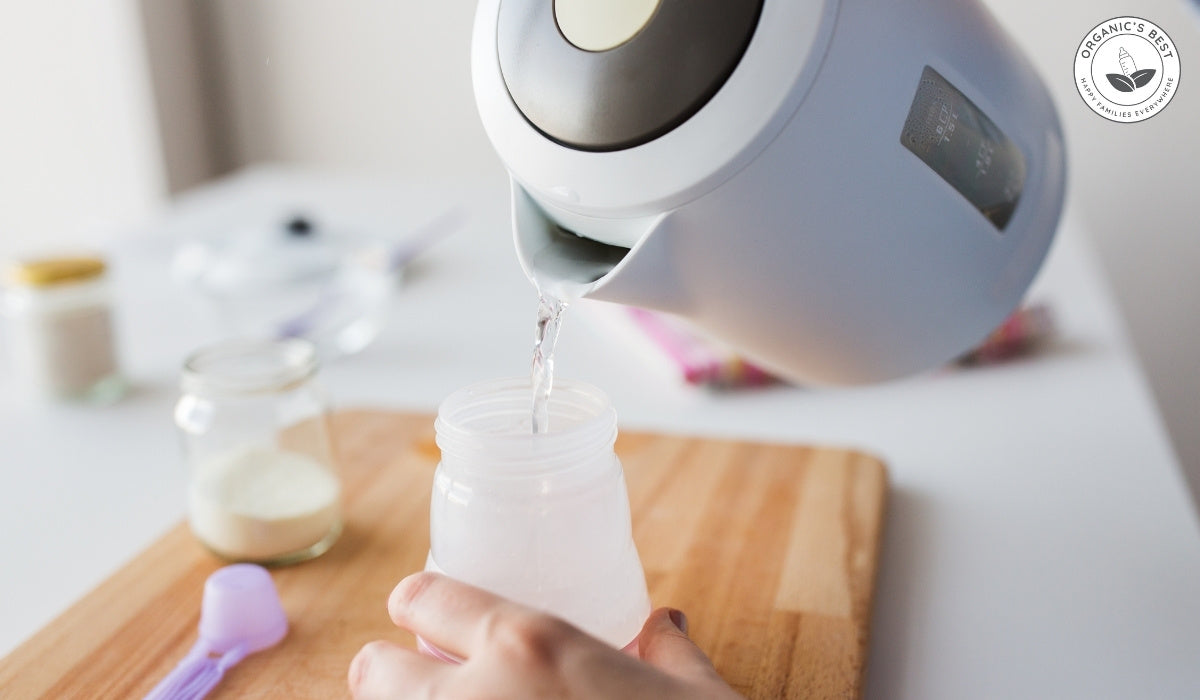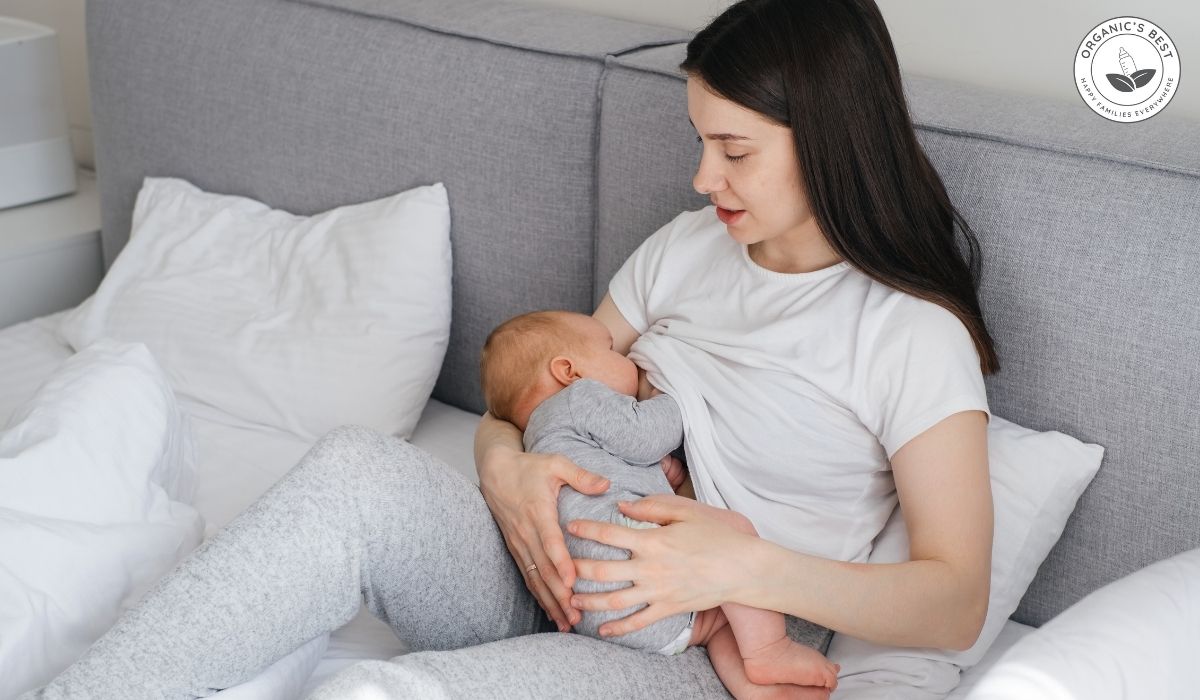Click to Get 2 FREE Boxes/Cans
Only New Customers! Click HERE to Get 2 Extra Boxes/Cans for Free With Your First Order.
BABY FORMULA
Offering new parents top-quality European infant formula from renowned brands like HiPP, Holle, Kendamil, and more. If you’re uncertain about which product to choose, our Formula Finder can help you make the best decision for your baby.
Baby Food
Offering new parents a premium selection of European baby foods, including jars, pouches, cereals, and snacks from esteemed brands like HiPP and Holle.
Preparation 101: What Water to Use for Formula
by Agustina Fernandez September 19, 2023 7 min read

Feeding your baby formula involves careful considerations, and one crucial aspect of making formula is selecting the right water for mixing. Whether you opt for a high-quality powdered formula or concentrated liquid formula, the choice of water is essential!
In this article, we aim to address the common query: What water to use for formula preparation? We compare different water sources, explore their advantages and disadvantages, and provide guidelines for the preparation of your baby's formula. Dive in to get the tools your need to prepare infant formula like a pro!
Table of contents
Understanding the Water Requirements for Formula Preparation
When it comes to choosing the right water for concentrated liquid formula or powder formula preparation, there are many possibilities. The manufacturers of infant formula typically suggest using 'safe drinking water' without specifying any particular source. So to make preparing formula more straightforward for you, here are the types of safe drinking water you can use, and our next section will explore their pros and cons:

Tap Water
In most cases, ordinary tap water is a perfectly fine, safe water source. However, depending on your area and plumbing system, your water could be tainted by contaminants such as lead, nitrates, or bacteria. Also, if your tap water exceeds 0.7 mg/L of fluoride, it's a no-go for your little one's health, as too much fluoride can lead to mild dental fluorosis.
This condition leaves faint white lines on your baby's teeth. However, the correct amount of fluoride in water helps prevent tooth decay. Ultimately, it's always smart to contact your local water company to get your water tested and ensure it's safe for your little one!
Filtered Water
Filtered water can remove specific contaminants, including chemicals, some minerals, and sometimes nitrates. Testing your tap water can help you choose the appropriate filtration system. However, even with filtration, it's safest to boil water before using it for formula to eliminate any potential bacteria, as most filter systems won't remove 100% of contaminants. Don't forget to replace your filters regularly to maintain water quality!
Distilled Water
Distilled purified water is boiled and then condensed into liquid form, effectively removing heavy metals, most bacteria, and many chemicals. It is a great option for baby formula, but you'll still need to boil the water before your prepare formula with it.
Bottled Water
When choosing bottled water, it's important to note that companies have created bottled waters specifically marketed for babies and mixing infant formula with. According to the Food and Drug Administration (FDA), these bottled waters must meet the same standards as tap water.
Just remember, their labels should say they're not sterile, never use bottled mineral water, and opt for low-fluoride bottled water. If you do select bottled water, be sure to give it a one-minute rolling boil before mixing it with your little one's formula!
Comparing The Pros and Cons of Different Water Sources
-
Tap water offers convenience as it is readily available, and it can help you save money compared to other water sources. However, its safety can vary depending on your location and plumbing, so it's always best to get your water tested first!
-
Filtered water provides the advantage of removing specific contaminants, such as chemicals and hard minerals. However, it's essential to remember that filtration systems have limitations and may not eliminate all contaminants.
-
Distilled water undergoes a purification process that removes heavy metals, most bacteria, and many chemicals, making it a suitable option for formula preparation. However, it should still be boiled before you add water to the formula powder.
-
Bottled water offers convenience and may provide a safer option for those concerned about tap water quality. However, if you are on a budget, this option does come at an extra cost. It is important to use bottled water specifically marketed for infants with a low mineral content to avoid potential health issues. Finally, remember that boiling water, even from a bottle, is still necessary.
Safe Practices for Preparing Formula with Water
According to the Centers for Disease Control, all babies, especially babies that are born prematurely, are at a higher risk of bacterial infection or illness as their tiny bodies work hard to grow, and every precaution taken during formula preparation plays a vital role in safeguarding their health and well-being.
With that in mind, here are some common safety practices to implement into your formula preparation routine!

-
Sterilizing Water and Equipment
Sterilization is key when preparing infant formula, this includes using boiled water and ensuring that all bottles, nipples, and utensils to prepare formula are properly sterilized before each use!
-
Proper Water Temperature for Mixing Formula
Maintaining the right water temperature is vital to safely preparing baby formula. The Centers for Disease Control advise that the ideal temperature for mixing formula is around 158°F (70°C). This hot water is enough to kill any potential bacteria but cool enough to prevent damage to the formula's nutrients. After boiling water, make sure to cool water for roughly 30 minutes before mixing it with your baby's formula.
You can check the formula temperature by putting a few drops of water on the back of your hand or wrist to ensure it's near body temperature before feeding your little one. Also, keep in mind that it's not necessary to serve warm formula to your baby; many little ones are perfectly happy to drink their baby formula at room temperature or even cool!
By the way, you might be interested in checking out our guide: Can Formula be Reheated? What You Must Know...
-
Importance of Accurate Water-to-Powder Ratio
As for the guidelines on how to safely mix formula, always follow the instructions provided by the formula manufacturer to determine the correct amount of water and powder formula needed.
Using too little water can result in a concentrated formula, which may be hard for your baby to digest, while using too much water can dilute the formula's nutrients.
-
Handling and Storage of Prepared Formula
Start by washing your hands thoroughly before handling the formula or feeding your baby. Feed the prepared formula to your baby immediately, or refrigerate it at a temperature below 40°F (4°C) if you're not using it right away.
You should also avoid leaving prepared formula at room temperature for more than 2 hours, as this can promote bacterial growth. Discard any leftover formula from a used bottle, as bacteria from your baby's mouth can contaminate the formula.
Learn more: How to Tell if Powdered Formula is Bad
Discover the secrets to preparing perfect baby formula with our step-by-step video guide. Watch as we walk you through the process and take the guesswork out of preparation to help you feel confident after every bottle.
Considerations for Babies with Specific Health Conditions or Sensitivities
For babies with compromised or weakened immune systems or specific health conditions, healthcare professionals may recommend using distilled or sterile water to minimize any potential risks associated with tap water.
Babies with certain sensitivities, such as those with fluoride allergies or kidney issues, may require careful consideration of the water used for formula preparation. These cases are rare but do require consulting with your baby's pediatrician to determine the most suitable water supply option.
Addressing Common Concerns

If you rely on well water or any non-standard water sources, additional precautions are important. Well water should be regularly tested to ensure it meets safety standards.
It's recommended to consult with your local health department or professionals experienced in well water testing and treatment. Their expertise can give you peace of mind in knowing your well water meets safety standards.
As for travelling with formula, it's crucial to plan ahead and consider water sources at your destination. Depending on the location, tap water safety can vary. It's advisable to use bottled water that is specifically labelled as safe for infants or bring along a reliable water filtration system!
FAQs
What Kind of Water is Safe for Formula?
Safe water options for preparing liquid concentrate or powdered formula include water which is boiled for one minute; you can choose from clean tap, distilled, filtered, or bottled baby water (sometimes called nursery water). It's important to ensure the water is free from contaminants and meets safety standards!
Is it Safe to Use Tap Water for Mixing Powdered Infant Formula?
If your baby is healthy, uncontaminated, safe tap water can be used for formula preparation after boiling it for one minute. If your baby has a weakened immune system, talk with your baby's doctor to learn if you need to take any extra precautions.
Can I Use Filtered Water for Making Baby Formula?
Filtered water can be used for formula preparation, but it's important to ensure the water filter used effectively removes contaminants by following the manufacturer's instructions for proper filtration. Make sure to boil the filtered water before preparing your baby's formula.
Should I Boil the Water Before Using it for Formula Feeding?
Yes, always! Regardless of what water you use, boiling water for one minute helps kill any potential bacteria or organisms that may be present.
Conclusion
We've navigated through the sea of information on choosing the right water for your baby's formula. From tap, filtered, distilled, or bottled water, your choice will depend on your specific circumstances and your baby's health needs. Besides, we've delved into crucial safety practices for formula preparation.
Remember, always prioritize your little one's health. Let your understanding of your baby's needs and your pediatrician's advice guide your decisions. Whether at home or on the move, always have a 'water plan' ready for your baby's formula. Keep these insights handy for safe, happy feeding!
|
Disclaimer: Please be aware that this information is based on general trends in babies, and it is not medical advice. Your doctor should be your first source of information and advice when considering any changes to your child’s formula and when choosing your child’s formula. Always consult your pediatrician before making any decisions about your child’s diet or if you notice any changes in your child. Breastfeeding is the best nutrition for your baby because breast milk provides your child with all the essential nutrients they need for growth and development. Please consult your pediatrician if your child requires supplemental feeding. |
Agustina Fernandez
Dr. Agustina Fernandez earned her medical degree from the prestigious Universidad Nacional de Córdoba, Argentina. With a deep-rooted passion for pediatrics, Dr. Fernandez is currently on the path to specializing in children's healthcare. Recently, she has delved into the vital field of infant nutrition. Her research interests include breastfeeding, infant formula, and baby food in little ones’ formative years. Dr. Fernandez's commitment to this area of study underscores her dedication to ensuring the health and well-being of children from their earliest days.
Leave a comment
Comments will be approved before showing up.
Also in Organic Infant Nutrition and Health Blog

10 Winter Activities for Kids and Toddlers
by Agustina Fernandez January 06, 2026 8 min read
Read More
How to Choose The Best Infant Formula: A Guide to EU Organic Formulas
by Agustina Fernandez January 05, 2026 14 min read
Read More
Best Formula for Breastfed Babies 2026 Guide
by Agustina Fernandez January 05, 2026 15 min read
Read More
Reviewed by Dr. Po-Chang Hsu, MD, MS
-

Dr. Po-Chang Hsu: Medical Reviewer of Organic's Best Blog
Dr. Hsu received his medical degree from Tufts University in Boston, Massachusetts, and holds a Master’s of Science degree from both Harvard University and Tufts University.

